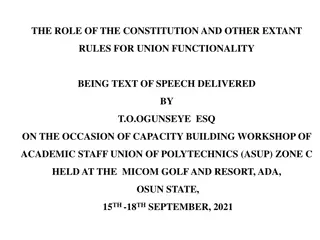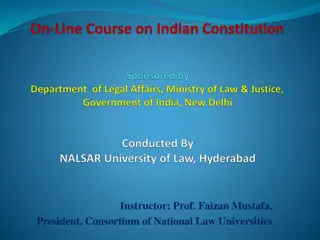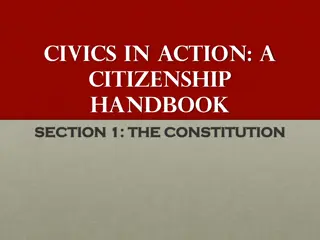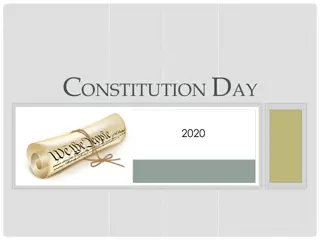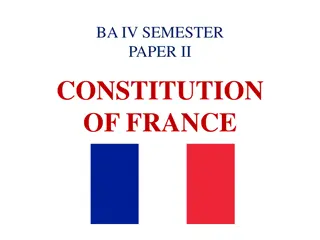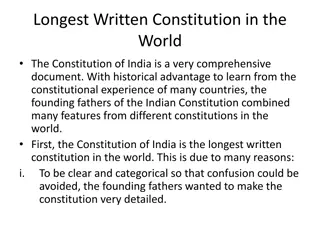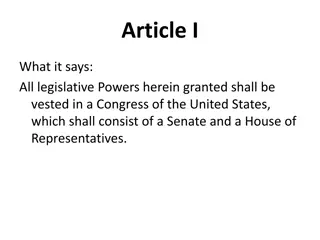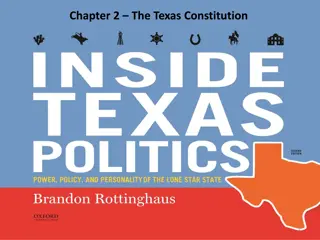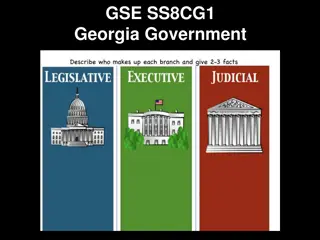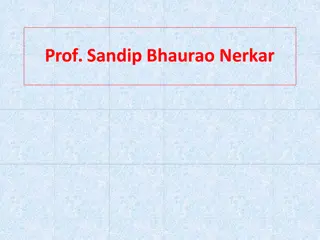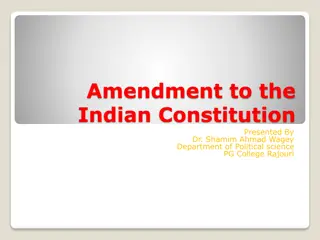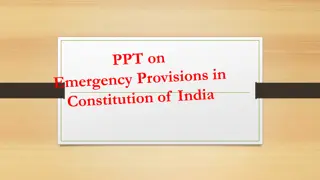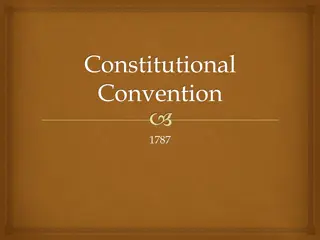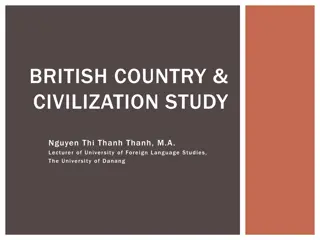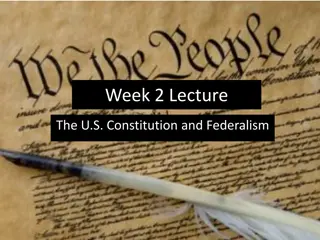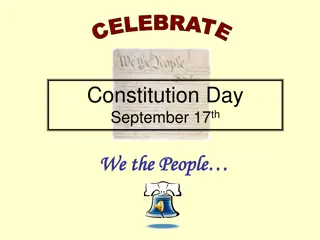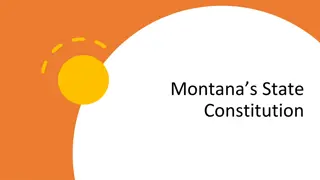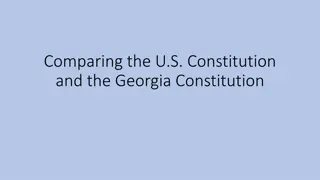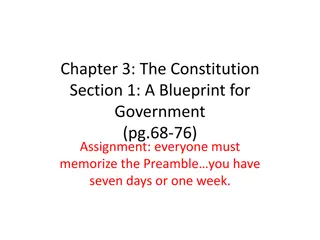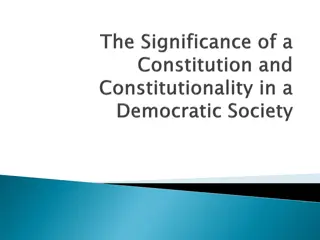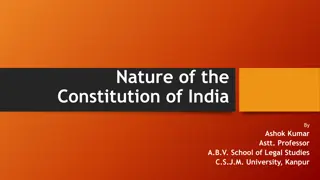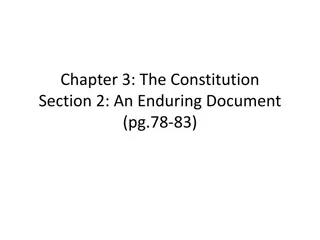Understanding the Importance of a Constitution in Government
Exploring the significance of a constitution in governance, this content delves into the definition, origins, and key features of the UK constitution. It highlights the need for a constitution to establish rules for government institutions, regulate their relationships, define civil liberties, and prevent abuse of power. Thought-provoking visuals and quotes underscore the critical role of a constitution in safeguarding citizens' rights and ensuring accountable governance.
Uploaded on Sep 16, 2024 | 0 Views
Download Presentation

Please find below an Image/Link to download the presentation.
The content on the website is provided AS IS for your information and personal use only. It may not be sold, licensed, or shared on other websites without obtaining consent from the author. Download presentation by click this link. If you encounter any issues during the download, it is possible that the publisher has removed the file from their server.
E N D
Presentation Transcript
Learning Objectives To define a constitution To identify the origins and purpose of the UK constitution To describe the key features of the UK constitution
Dictionary Corner Find the definition CONSTITUTION A constitution is a set of rules that; Seek to establish the duties, powers and functions of the various institutions of government Regulate the relationship between and among the institutions Define the relationship between the state and the individual; i.e. define the extent of civil liberty
Why does the UK need a constitution? Mind map as many reasons as you can think of as to why the UK would need a constitution. HINT: Think about what might happen if there was no constitution!
Why does the UK need a constitution? Set up institutions to interpret the laws and punish those who do not follow them The government has to follow rules too, to make sure it is not abusing its power Protect the rights and civil liberties of the population Set up institutions that pass laws (legislature) Set up institutions to enforce (make sure everyone follows) the laws State the roles and duties of those in government what they can and can t do State the functions and powers of departments or parts of government what they can and can t do State how parts of the government work should together To make sure the government provides certain things for the people defence, welfare etc. How government is appointed or selected e.g. elections People to make decisions
The most terrifying words in the English language? What point is the cartoonist making about government? We cannot trust the government or, for that matter, anyone who has power over us.
The unfortunate reality of having a government? What point is Thomas Jefferson making about government power? If government power is not checked and restrained then it could have disastrous consequences.
The unfortunate reality of having a government? What does this quote by Ronald Reagan mean? In order for our rights and civil liberties to be protected, government power must be limited so that it can not take away our freedoms.
Why does the UK need a constitution? Set up institutions to interpret the laws and punish those who do not follow them The government has to follow rules too, to make sure it is not abusing its power Protect the rights and civil liberties of the population THE MOST IMPORTANT REASON Set up institutions that pass laws (legislature) power. (Power tends to corrupt, so we need to be protected from those in power). A constitution is the solution to the problem of Set up institutions to enforce (make sure everyone follows) the laws State the roles and duties of those in government what they can and can t do simply do whatever it wants oppressing minorities, violating freedom, tyrannising the mass of the people. State the functions and powers of departments or parts of government what they can and can t do Without a constitution the government could State how parts of the government work should together To make sure the government provides certain things for the people defence, welfare etc. How government is appointed or selected e.g. elections People to make decisions
Dictionary Corner Write your own definition LIMITED GOVERNMENT A form of government in which government power is subject to limitations and checks, providing protection for the individual; the opposite of arbitrary government.
What types of constitution are there? Parliamentary There are 12 ways in which constitutions could be categorised. Some constitutions, such as the UK constitution may have features of multiple types of constitutions. Codified/Written Rigid Uncodified/ Unwritten Federal Republican YOUR TASK; Unitary Flexible Match each type of constitution to its description. Monarchical Presidential Sovereignty of parliament Make a list of the types of constitution the UK constitution may fit into. Sovereignty of people
All the main sources of the constitution are in one document. (e.g. USA from 1787). President has power independent/separate from Congress (e.g. US) Can be altered by the law making process (e.g. Parliament in the UK) Power supposedly in the power of the people. (e.g. US Constitution opens with We the people of the US . Many of the constitutional rules are written down but they are not gathered together. Also, rules are found in convention and tradition. (e.g. UK/Israel/New Zealand) No separation of powers as leader is accountable to legislature (e.g. Executive chosen from Parliament in UK) Head of state is elected. Power in hands of monarch Power in hands of a central government where little regional differences. (e.g. UK) Division of power with regional units (e.g. US division between central govt and states/Germany/Belgium) Constitution becomes law. Difficult to bring changes without extensive discussion. (e.g. USA) Parliament possesses supreme power. Can make or unmake any law of its choosing (e.g. UK)
Parliamentary No separation of powers as leader is accountable to legislature (e.g. Executive chosen from Parliament in UK) Codified/Written All the main sources of the constitution are in one document. (e.g. USA from 1787). Rigid Constitution becomes law. Difficult to bring changes without extensive discussion. (e.g. USA) Uncodified/ Unwritten Many of the constitutional rules are written down but they are not gathered together. Also, rules are found in convention and tradition. (e.g. UK/Israel/New Zealand) Federal Division of power with regional units (e.g. US division between central govt and states/Germany/Belgium) Republican Head of state is elected. Unitary Power in hands of a central government where little regional differences. (e.g. UK) Flexible Can be altered by the law making process (e.g. Parliament in the UK) Monarchical Power in hands of monarch Presidential President has power independent/separate from Congress (e.g. US) Sovereignty of parliament Parliament possesses supreme power. Can make or unmake any law of its choosing (e.g. UK) Sovereignty of people Power supposedly in the power of the people. (e.g. US Constitution opens with We the people of the US .
Main Features of the UK Constitution The UK could potentially fit into a number of the categories discussed. However, political scientists agree that there are 5 key features of the UK constitution. Parliamentary Sovereignty Uncodified Unitary Fusion of powers Flexible
Origins of the UK Constitution One of the reasons why the UK does not have a codified constitution is that British political history over the past 3 centuries has followed an evolutionary rather than a revolutionary route. In other countries, written constitutions have been introduced following sudden and total changes to their political systems. The French Revolution of 1789 and the Russian Revolution of 1937 both led to the introduction of written constitutions. Similarly, new written constitutions were introduced in Germany after defeat in 1918 and 1945, and India drew up a written constitution when British rule ended in 1947. The Origins of the UK Constitution [VLE]
Origins of the UK Constitution The American constitution emerged from the smoke and gunfire of a revolution whereas the British constitution emerged from the mists of time. Malcolm Walles
Main Features of the UK Constitution Uncodified Parliamentary Sovereignty Sovereignty means supreme, unrestricted power. In this case, the absolute and unlimited authority of Parliament which can in theory make, repeal or amend any law. This type of constitution is not confined to one single document. Much of it may be written down, but in a variety of documents. This is known as an uncodified constitution or an unwritten constitution.
Main Features of the UK Constitution Fusion of Powers Unitary In this type of constitution and system o government, ultimate power lies with a central body which I sovereign. Theoretically, in Britain, it is parliament that is sovereign. It has the legal authority to make and repeal laws, to delegate powers to local or regional authorities. The opposite is a federal constitution, where legal sovereignty is shared between government at the centre and the constituent states e.g. USA. This is where the executive branch and legislative branch of government intermingle. E.g. David Cameron is both a member of the legislative branch (MP for Witney) and the executive branch (Prime Minister) E.g. Vince Cable is both a member of the legislative branch (MP for Twickenham) and the executive branch (a member of the Cabinet)
Main Features of the UK Constitution REMEMBER!!! Flexible This type of constitution is one where changes can take place without a lengthy special procedure e.g. Parliament can simply pass another Act of Parliament. The opposite of flexible is rigid; where changes can only take place as a result of a special constitutional amendment procedure. Parliamentary Sovereignty Uncodified Unitary Fusion of powers Flexible PUUFF
The UK Constitution An authorative set of laws, rules and practices specifying how a state is to be governed and the relationship between the state and the individual. Establishes political principles, structure, procedures, powers and duties of a government. Set out division of governmental activities and who will perform each task. Decides how powerful different parts of the government will interact and work together. Sets out the limitations of the power of rulers and guarantees the rights of the ruled. Provides legitimacy to those in power, encourage governmental stability through clear rules and set out goals and values of a state.
Homework Reading and Note taking, Heywood p179-186 The Purpose of a Constitution Understanding Constitutions Consolidating your understanding The UK Constitution Nicola McEwan The Constitution; Origins and Characteristics Further Reading Development of the UK Constitution PPT Britain s Unwritten Constitution (British Library)


